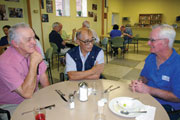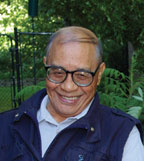Remembering Bishop Claver
1929-2010
By Fr. Pat Kelly, S.F.M.
March/April 2011
Return to Table of Contents
Print Article
Fr. Charlie Gervais and I spent part of our missionary life in the Philippines with Bishop Francisco "Cisco" Claver in the diocese of Malaybalay, Bukidnon. Charlie was in the parish of San Fernando and I was in the parish of Linabo. We became close friends with Cisco. In 1972, Philippine President Ferdinand Marcos scrapped the constitution and declared martial law, which was to last until 1981. During that time, the military was very active in both of our parishes and they created a state of fear among the people.
 Fr. Charlie Gervais, Bishop Francisco Claver and Fr. Pat Kelly chat in the dining room at Scarboro Missions during Bishop Claver’s visit to address the Assembly at Scarboro’s 12th General Chapter 2007.
Fr. Charlie Gervais, Bishop Francisco Claver and Fr. Pat Kelly chat in the dining room at Scarboro Missions during Bishop Claver’s visit to address the Assembly at Scarboro’s 12th General Chapter 2007.
Nearly every week we would go to Cisco and relate to him the happenings within the parishes and how the people were coping. I can still see him holding his pipe, listening intently to what we were saying and making comments to encourage us.
In both of our parishes at that time, there were many killings, including Fr. Godofredo Alingal who was shot and killed in his rectory in Kibawe, Bukidnon. For Bishop Claver, a primary focus of the Church was nonviolence. The community of believers was to be the instrument and witness to the way of change for the good of all. As Charlie would say, "no pious piffle ever came out of Claver." The bishop's message could be applied to the concrete situation—in the struggle for justice, peace, truth, and love. Cisco was very adamant that the Church was to be Good News to the poor and in order to be that, we must look at reality from the side of the poor and oppressed.
With martial law, the reality of those without a voice and without power, those most vulnerable, was clearly evident.
Martial law also galvanized many groups who believed armed struggle was the only way to depose Ferdinand Marcos.
Cisco, in his role as bishop, encouraged the people in his sermons, talks, and writings to look for creative ways to dismantle the dictatorship, but nonviolently. There were many demonstrations, boycotts, and other mass actions to publicize opposition to the regime, and many members of Christian communities suffered greatly for their call for justice. In the end, these actions bore fruition in the marvellous and nonviolent People Power revolution that forced Ferdinand Marcos to resign and leave the country in 1986.
Fr. Charlie recalls, "I will never forget the joy of celebrating with the people when they finally expelled the dictator in a nonviolent demonstration in the streets of Manila. I was there when millions of Filipinos stopped military tanks with their bodies, rosaries, prayers and flowers."
For me, Bishop Claver made real what we say in the Our Father: "Your Kingdom come, your will be done."
For Cisco, the purpose of the Church is to change this world for the good of all. Each believer must use their gifts and talents to make real, even in a small way, the vision that we are all part of one human family and to do that within people's concrete lived situation.
In God's providence, Charlie and I were given a precious gift: the gift of knowing Cisco, being molded in our missionary life by him, and being allowed to work with him to proclaim and witness to God's love of all people. He helped us to see the importance of building the Kingdom of God here on earth.
On being Church in Bukidnon
Excerpts from a pastoral letter of Jesuit Francisco Claver, Bishop of the Diocese of Malaybalay, Bukidnon, October 11, 1981. Scarboro missioners Frs. Pat Kelly and Charlie Gervais were serving in the diocese at that time.
This year we celebrate the 12th year of the setting up of the Prelature in Malaybalay...From a strictly human point of view, our history as a Church has not been a happy one.
- The '70s started with the clergy and religious under heavy attack as being Communists, destroyers of the peace, troublemakers, etc. All they did was to give strong support to the FFF (Federation of Free Farmers).
- In the local elections of 1971, our parish school in Dangcagan was burnt to the ground as a warning to us not to "meddle" in politics. Our "crime": our close cooperation with the movement for clean elections, the CNEA (Citizens' National Electoral Assembly).
- When martial law was imposed in late 1972, the first prisoners of the regime were the director of our Social Action Center and two of his associates. Their "crime": their work for justice for farmers.
- In 1976, our radio station DXBB was forcibly shut down by the military. Its real "crime" was its unflinching advocacy of freedom even under dictatorial rule.
- Shortly after, in early 1977, our newsletter, Ang Bandilyo, was also suppressed. The charge was subver-sion and rebellion. The real issue was the speaking of the truth of our political situation...of military oppression.
- This year, in April, Father Alingal was shot dead. His work for justice was not appreciated by the powerful.
...All these events happened because the Church had become deeply involved with people, had become in fact a Church of the people, not only a Church of laws and doctrines, of rites and ceremonies and sacraments. The Church had broken out of the narrow confines of sacristy and sanctuary, and had gone to the people where they were. Doing so, it has had to identify with them in the oppressions and injustices imposed on them by our current political and economic system.
...We—priests, religious, lay leaders, people —have centered our efforts on building ourselves up as real communities of faith, strongly aware that this faith is not something we celebrate only periodically in our chapels and churches... Faith is something we have to do in day to day living, the impelling force, in fact, of all our striving for individual and family betterment, for more widespread social justice, for greater economic and political equity, for the genuine development of ourselves as the People of God, men and women of rights and, even more fundamentally, of dignity...
Return to Table of Contents
Print Article
